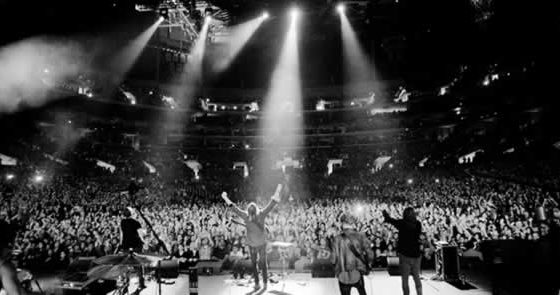The first Christians had a phrase for what happens when people properly respect and acknowledge the image of God in those around them. In the letter to the Ephesians, we read about a group of people who were previously divided because of race, background, wealth, socio-economic status, worldview, and religion. One group is made up of Jews, the other Greeks, and in this new church, they find themselves united because they’ve all become followers of the resurrected Jesus Christ. All of the old categories simply don’t work anymore. This new commonality, this new bond, is simply bigger than all of the things that had previously kept them apart.
The first Christians called this the “new humanity.”
In the beginning, God created us “in his image.” So first, God gave us an image to bear. Then God gave us gender: male and female. Then God gave us something to do, to take care of the world and move it forward, taking part in the ongoing creation of the world. Later, people began moving to different places. It takes years and years of human history to get to the place where these people are from here and those people are from there. Different locations, skin colors, languages, and cultures come much later in the human story.
What we often do is reverse the creative process that God initiated. We start with different cultural backgrounds and skin colors and nationalities, and it’s only when we look past these things that we are able to get to what we have in common ? that we are fellow image-bearers with the shared task of caring for God’s creation. We get it all backward. We see all of the differences first, and only later, maybe, do we begin to see the similarities.
The new humanity is about seeing people as God sees them.
I was having lunch in September of last year with a group of people I had just met. We were discussing the kind of work we each did and places we had been, and one man started telling stories about being in the marines. He had led one of the first groups into Iraq during the Gulf War in 1991. He talked about what it was like to enter enemy territory and to be shot at ? about the complexities of war ? and he had us all on the edge of our seats. During one battle he and his marines won quickly, they had to arrest the soldiers who had just been shooting at them. They lined them up and were handcuffing them when one of them ran up to him waving a letter, begging to have it sent immediately. The man was frantic and starting to cause a scene. He kept repeating that this letter he was holding had to be sent immediately. He then looked the marine in the eyes and said, “Please mail this letter for me. It’s to my father, and he must know that I love him.”
The man telling the story paused, looked around the table at each of us, and said, “He had no idea about the troubled relationship I had with my own father. Here I am, out in the middle of nowhere in the desert of Iraq, trying to arrest a group of soldiers who moments before were trying to kill me, staring at a man who wants me to mail a letter for him, thinking, I could be him.”
Several years ago a woman called the church where I was a pastor because she wanted to talk. We set up a time to meet, and when she showed up, I asked her how I could help. She said that she was a prostitute and didn’t want to live anymore, so she had made a plan to kill herself. She described in detail how she was going to do it, when she was going to do it, and where it was going to happen. She was very thorough. She said she was telling me all of this because she had to know whether she would go to heaven or hell when she died. Somewhere in the course of telling me her plans, she mentioned that she had a daughter because one of her clients had gotten her pregnant. She was confident that a family member would raise her daughter when she was gone.
I asked her to tell me more about her daughter. She gave a few details. Then I asked what her daughter’s name was. She replied, “My daughter’s name is Faith.”
Faith.
There are these moments when the enemy all of the sudden becomes just like me.
When a soldier becomes a son.
When a prostitute becomes a mother.
When they become we.
When those become us.
When he becomes me.
Moments when all of the ways that we divide ourselves and rank each other and convince ourselves of how different, better, and unalike we are disappear, and we are faced with the fact that first and foremost, we are humans. In this together. And not that much different from each other.
Jew. Gentile.
Marine. Iraqi.
Orphan. Family.
Pastor. Prostitute.
We could be them.
From Sex God by Rob Bell Copyright © 2007 by Rob Bell, published by Zondervan, used with permission.
[schemaapprating]










